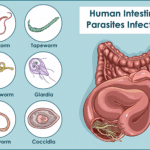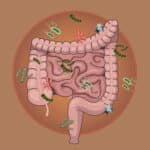Why Food Sensitivity-Intolerance Testing Is Not Valid for SIBO Patients
I have had so many new patients call me after they have been struggling to pull the foods listed on a food sensitivity panel – trying to figure out what they can eat. They come into my office and show me their lab, which is covered in red lines showing reactions to just about everything. What they always say to me is, “The test shows that I am reacting to everything that I am eating.” So, does it make sense to pull all the foods that a food intolerance test shows that you are reacting to? Do these tests have any validity?
Let me first distinguish between a true food allergy and a food sensitivity, or intolerance and discuss what they are testing.
Food allergies are reactions to the proteins that are in food. A true allergy is an IgE mediated immune reaction. IgE stands for Immunoglobulin E mediated reaction – you get exposed to a protein in a food and your immune system is triggered to mount an IgE response. The response can be either acute (immediate) or a delayed reaction. An IgE immune response causes a release of chemicals in the body called histamines or leukotrienes, which trigger an allergic response with symptoms like rashes, mouth tingling, mouth or skin sores, itchy skin, swelling, wheezing and full blown anaphylaxis.
People usually know what they are allergic to. They know what makes their mouth tingle or bring on a mouth sore and they definitely know what might cause an anaphylaxis reaction. Food allergies are tested by a skin prick test, where the skin is exposed to various food items and then monitored to see if a reaction occurs – welt or redness.
What people are often less clear about is whether they have a food sensitivity or intolerance. Some labs are using blood to test for an IgG reaction (Immunoglobulin G) reaction. This is a different antibody mediated reaction – it is an IgG reaction versus an IgE reaction- and it does not result in a histamine or leukotriene release. The IgG immune reaction supposedly measures exposure of incompletely digested food proteins that have crossed the GI tract and entered the blood stream. When an indigested protein enters your blood stream, the only defense that your body has at that point is to mount an immune defense. So the IgG test is looking for antibody-antigen markers for specific food proteins that have entered your blood stream.
"Are Food Sensitivity or Intolerance Tests Valid if You Have SIBO? Reading a great post on SIBO Guru"
↑ Tweet ThisDo I think that people have food intolerances that are contributing to inflammatory, neurological, pain, autoimmune and digestive disorders? Unequivocally YES! I see this every day. It is my job to help people figure out what they are reacting to. Do I think that we can accurately measure food intolerances with an IgG blood test? NO! We can’t.
Unfortunately there is little to no evidence of the efficacy of these tests being used to identify food intolerances. NO evidence. IgG testing is used to diagnose certain autoimmune conditions, and demonstrate serum immunity to the measles, mumps and rubella or hep B or even chicken pox, but no validated studies on this testing, as it applies to food intolerance testing, is available.
Now, you know from my blog – I do not always agree with the stances of our various US medical associations, BUT the US is not alone in this stance. Associations and societies of immunology and allergy from various countries also state that there is no evidence of the validity of IgG food intolerance tests – Australia, Europe, Germany, Singapore, and the UK are among them.
Are These Tests Valid?
One research group in the UK checked out these tests (our equivalent to Consumer Reports) which claim to diagnose food intolerances through analysis of blood samples or strands of hair.
What they found is what I see clinically, so I thought that I would share this with you.
They found that:
- The tests diagnosed 183 intolerances – although the researchers actually had just one medically confirmed allergy and one food intolerance between them
- Identical blood and hair samples sent under different names to the same company produced different test results
- There was little or no overlap between test results from different companies
- The tests recommended excluding up to 39 foods – which could make it difficult to eat a balanced diet and lead to nutritional problems.
Clinically, for me, it doesn’t get much better. I have often found obscure foods showing up on the test (ones that the person has never eaten); I see false negatives, false positives, or the test shows that they react to everything.
The only clinical pearl that I gleam from seeing the test showing that they react to everything is that they their immune system is being triggered and that they likely have leaky gut which we would have found out by looking at their health history and talking about their current symptom set. What we cannot do with this information – WE CANNOT PULL ALL THE FOODS THAT THE PATIENT IS SHOWING WIDE SPREAD REACTIONS TO ON THESE TESTS – THIS WILL CAUSE MORE HARM THAN GOOD.
When you have leaky gut, you are going to have indigested proteins cross over and enter your blood stream. The foods that you eat on a daily basis are the ones that will be introduced with such frequency that the test will likely come back showing that you are reacting to everything, but this has more to do with the immune system being chronically triggered because of the leaky gut.
Here is the catch, if you pull all of these foods, over time, you could start to react to the new foods that you start to eat with frequency. This will also cause widespread nutrient deficiencies in people who are already inflamed because they are now on an extremely limited eating plan.
So, when a patient says to me, “The test shows that I am reacting to everything that I am eating” we need to change the understanding of what is going on here. They likely have leaky gut, inflamed mucosal membranes and the foods that they are consistently eating are making their way into the blood stream and the immune system is being triggered. That is why this test is showing that they are keying up on everything that they are eating.
Through a conversation with a licensed nutritionist you can easily identify which main foods you are reacting too, pull those main offenders, and lightly rotate the rest… while at the same time supporting digestion from the top down, addressing nutrient deficiencies, address the leaky gut, heal your gut and address you flora levels.
We should look at it this way – a food sensitivity is a symptom that something is imbalanced in the gut. This is what needs to be addressed!
I especially sway people away from either running these tests OR following the test results when they have a mucosal inflammatory condition – like an inflammatory bowel disease or gastritis, esophagitis or eosinophil esophagitis, if they have known leaky gut, or an autoimmune condition (because their immune system is going to be hyperactive to begin with), or if they have SIBO – these tests will be even less useful.
If you have SIBO, you should be focusing on a LOW fermentable eating plan and treating SIBO. Yes, you should pull known allergies and known food intolerance (when I eat ‘x’ food it makes my stomach hurt or gives me a headache), but trying to couple a LOW fermentable plan with the results of a food sensitivity panel will be downright disastrous. Along with the widespread nutritional deficiencies that will begin to appear, you will have less stamina, likely lose weight (not in a good way) and you will start to become even more hyper-reactive to the very few foods that you continue to eat.
The only time that I have really seen a value to running a food sensitivity panel is when a patient MUST have a lab in hand that shows them that they may have a food sensitivity and this validation gives them the motivation to finally change their diet.
Hands down, I would rather that you spend your money on a digestive stool analysis that will look at inflammatory markers, gut metabolism, flora levels and overall gut health than spending your money on a food sensitivity panel.
Angela Pifer, SIBO Guru
Enjoying this content? Sign up for updates... It's FREE!


















Comments
from 21 people
No - I don't recommend that ALCAT at all. It is a very poor test, with little reproducability. SIBO triggers are foods that ferment (flares symptoms, but does not cause SIBO, nor does it make SIBO worse). We cannot test these on a food sensitivity test. Fructose or lactose intolerance tests can determine if an individual would see symptoms when consuming lactose and fructose, but these are not 'food sensitivities' nor 'food allergies.' Food reactions with SIBO are a symptom. We need to keep in as much variety as possible with the diet. We cannot starve out the organisms with the diet. Warmly, Angela
Angela Pifer
Do you think that the ALCAT is a good test for SIBO, in knowing what foods to always avoid?
Thanks
Lisa
Lisa
Hi Layla,
I appreciate what a struggle it is for you to find a food plan that sits well with you. I whole-heartedly recommend finding a practitioner to work with on this. FODMAP alone can be difficult and so can AIP, but when you try combining them, it is hard.
Warmly
Angela
Angela Pifer
Hi Angela!
I love what your saying about not restricting the diet too much, backing yourself into a corner with food choices, etc. HOWEVER - here's a tough question for you! I cleared SIBO a few months ago, and have since then been working on gut healing alongside a low fermentable eating plan (SIBO specific, minus my only obvious food allergy to eggs) but am making very slow, if any progress with symptoms. I still have leaky gut, massive inflammation and many of the same old GI issues (bloating, etc). (I also tested negative for SIFO via the Great Plains OAT, and re-tested negative for SIBO a few weeks ago.) This tells me my issue is definitely in the diet!
I'm now thinking of switching to an anti-inflammatory (AIP) healing diet combined with low-histamines, which I'm still super reactive to after SIBO. Problem is, after pulling all these foods plus eggs, I'm basically forced into a more highly fermentable eating plan, with high-FODMAPs and starches being necessary for sustenance and diversity. I still don't react well to these. I have dysbiosis of the colon with several overgrown commensals (klebsiella, enterbacter) but no serious pathogens or yeast.
Do you think this is a crazy approach? Should I still be more focused on limiting FODMAPs/fermentable foods at this point, or is AIP/low-histamine a better way to go? No possible way to do all three and not lose my mind...
THANK YOU in advance! And so sorry for the long comment!!
Layla
Hi Twinkles,
We use probiotics because of their immune modulating properties. Their DNA cross talks with our immune system and helps it not be so hyper-reactive. Probiotics do not cause our flora to multiply uncontrollably.
If you have had a bowel resectioning, or if your SIBO is due to adhesions, then you do need to take this into consideration when using a probiotic.
You are also sharing here that you are positive for mastocytosis (for everyone else, this is a mast cell activation disorder where histamine is dumped into the system leading to a whole range of symptoms). I am sorry to hear about your diagnosis. I would not include a probiotic in your case. Addressing the mastocystosis is first, then your gut and then healing. Probiotics may be better placed during the healing process for you.
Yes, here are just a few studies that show probiotic use to be beneficial with SIBO treatment and recovery:
http://www.ncbi.nlm.nih.gov/pubmed/21381407http://www.ncbi.nlm.nih.gov/pubmed/21381407http://www.ncbi.nlm.nih.gov/pubmed/21381407http://www.ncbi.nlm.nih.gov/pubmed/21381407
http://www.ncbi.nlm.nih.gov/pubmed/18763284http://www.ncbi.nlm.nih.gov/pubmed/18763284http://www.ncbi.nlm.nih.gov/pubmed/18763284http://www.ncbi.nlm.nih.gov/pubmed/18763284
http://www.ncbi.nlm.nih.gov/pubmed/23244247http://www.ncbi.nlm.nih.gov/pubmed/23244247http://www.ncbi.nlm.nih.gov/pubmed/23244247http://www.ncbi.nlm.nih.gov/pubmed/23244247 this one shows lactobacillus used after antibiotic
http://www.ncbi.nlm.nih.gov/pubmed/25579140http://www.ncbi.nlm.nih.gov/pubmed/25579140http://www.ncbi.nlm.nih.gov/pubmed/25579140http://www.ncbi.nlm.nih.gov/pubmed/25579140
http://www.ncbi.nlm.nih.gov/pubmed/25244414http://www.ncbi.nlm.nih.gov/pubmed/25244414http://www.ncbi.nlm.nih.gov/pubmed/25244414http://www.ncbi.nlm.nih.gov/pubmed/25244414
http://www.ncbi.nlm.nih.gov/pubmed/23653934http://www.ncbi.nlm.nih.gov/pubmed/23653934http://www.ncbi.nlm.nih.gov/pubmed/23653934http://www.ncbi.nlm.nih.gov/pubmed/23653934
http://www.ncbi.nlm.nih.gov/pubmed/17378388http://www.ncbi.nlm.nih.gov/pubmed/17378388http://www.ncbi.nlm.nih.gov/pubmed/17378388http://www.ncbi.nlm.nih.gov/pubmed/17378388
Warmly
Angela
Angela Pifer
My neuro motility GI currently believes in no probiotics during sibo treatment and healing and feels not everyone needs them anymore thru pill form. Food is fine but I am lactose fructose and fructan intolerant to my only option is to ferment in histamine proof jars just to be safe. he is not the only one that is now having this thinking about probiotics its very new thinking. Many very top motility and sibo specialized GI are now thinking this way. It only multiplies the bacteria even the good ones that are in the wrong place. Can you talk more about this. Diet is harder because MD dont know that much. I am lucky mine is making me wait post drug treament for my microbe to balance out while I await some labs and other test for mastocytosis since I had a positive skin biopsy. He wants to get thru that before and more time. I am doing alot better but would love nutrition advice but I dont know if you are fit for me if you also practice as I have a F M Doctor and him. I would not go against his new thinking on probiotics.
Twinkles
Hi Nellie,
Yes I am very familiar with FODMAP, GAPS, SCD... etc. None of these were created to address SIBO directly, yet I find that a FODMAPs comes closest. Diet will not treat SIBO. What it helps with is to address symptoms while going through treatment. I find that pretty much all my patients are dealing with daily, and often debilitating symptoms. Diet will help to calm these symptoms down during treatment (herbal or antibiotic treatments often take multiple rounds to reduce the microbe to the point that gut healing and rebalancing can take place).
Warmly, Angela
Angela Pifer
Are you familiar with FODMAPs and does avoiding those foods really work to solve SIBO, what is your opinion?
Nellie
Hi Angela,
I have been on a SIBO protocol for 3 months now with my nutritionist and have made a little progress but not much. I am on the SCD not feeling my best on it because i have an underlying condition (lyme disease) that it seems to be exacerbating. I know that to get rid of SIBO for good you have to find the proper cause, my nutritionist thinks the cause might be that i didn't do the diet the first time around but i am concerned that there might be a different cause that is not being looked into.
I was misdiagnosed in 2011 as having vestibular migraines and was put on amitriptylene and ended up having a severe reaction to the drug. My side effect symptoms never went away and they include muscle twitching, burning sensations, muscle pain, numbness, tingling, acid reflux/ indigestion and gastritis (the gastritis is the only thing that went away). The drug affected all the muscles and nerves in my body and i have had the sensations every where. I thought if that drug affected all my muscles and nerves in that way is it possible that it is affecting the muscle and nerve response throughout my gi possibly causing the sibo? I want to make sure we are getting to the root of this problem because i want to address it properly. The SIBO started 1 1/2 - 2 months after I came off this drug and developed all the side effect symptoms. I know it is related because this was not a part of my problem prior.
I wanted to know what you think the possible cause might be, I really want to get rid of this and am concerned because i keep developing new sensitivities and am afraid where I'm heading if i don't get a handle on this. I appreciate your help and advice, thank you.
Michelle
Hi Haley,
I am sorry that you have to deal with all of this at such a young age. You'll need to work in a gut healing protocol, support digestion from the top down (make sure that you are making enough stomach acid, digestive enzymes... .gut motility is good), treat the bugs and expand on your diet asap!... staying on such a limited plan is going to make things a lot worse. Probiotics are going to be a part of this, but there is more work to be done to help support the change that you are looking for. You will tax your body and immune system to such a degree that you will not be able to heal your gut. I highly recommend that you find a practitioner to work with so they can really customize the approach and help you get your health back.
Angela
Angela Pifer
After completing a Diagnostechs stool panel, I have started a protocol of FC Cidal and Dysbiocide + Megaspore Biotic + Endozin. My lab results showed a pathogenic bacteria called Aeromonas Veronii (in the class of Salmonella) and virtually no good bacteria, as well as an inflamed gut and possible blood in my stool. I am 22 years old and have been trying to cure my digestive/autoimmune/weight/mood/eating disorder symptoms for 7 years with every protocol I could get my hands on. Now I know what the problem is but worry I won't be able to improve as my diet consists only of meat (mostly fish), avocado, coconut and leafy greens. These 4 foods have been my diet for 7 months and before that I have followed restrictive diets for many years. How can i rebalance my micro biome on such a limited diet? Anything else seems to create an inflammatory reaction. Since starting these supplements 2 weeks ago I have experienced increased hunger/cravings and weight retention as well as constipation.
I would love your opinion on this issue. Food intolerances are soo tricky & seem to be a vicious cycle.
Haley
The allergy test I took was for IGG and IGA, and did not include IGE. I showed allergies in both panels. Do you know anything about the validity of IGA tests? At the time I was tested I also did a stool test and was tested for parasites 2 years ago. Do you think it would be necessary to retest my stool? I am going to try reintroducing the IGG foods into my diet soon and rotating my food choices more. Thank you!
Jessica
Hi Jessica,
You tested positive for food sensitivities IgG and not allergies IgE. Allergies do need to be removed (true IgE mediated immune response). If food allergies, these are likely showing up because you have a leaky/ permeable gut. It can be very difficult if you are trying to combine the full list of IgG foods and ANY other diet - there is likely too much cross over and you'll work your way down to too little foods choices - which over time, will leave you less nourished, more depleted and create a whole other host of issues. I would look more to pulling foods that you know you have a reaction to (you have experienced this reaction), support digestion from the top down, work on gut healing, rotate your food choices (ex: don't eat almond butter daily, give yourself a 3-4 day break from time to time) and target why this is being set up in the first place - I would seek out a Digestive Stool Analysis plus parasitology x 3 day stool collection to start with.
Warmly,
Angela
Angela Pifer
Hi Angela. I was diagnosed with a large list of food allergies a year before I was diagnosed with SIBO and it does make it hard to follow a low FODMAP diet. I tried the low FODMAP diet for about 4 or 5 months and tracked my calories for several days during the diet and was only getting about 1300 calories even though I felt like I was trying. Some of my allergies like dairy, I have tested and I know I do not do well with it because it gives me instant loose stools but do you recommend that I eat the foods that tested positive for IGG panel? I am currently doing a Whole 30 Paleo diet and am thinking about switching to the FODMAP again, it is just emotionally challenging for me to do so because I want to feel nourished with whatever diet I am on while addressing the SIBO. Thank you!
Jessica
Hi Michelle, this is false information. SIBO is a condition of an underlying imbalance in the gut, a gut motility issue and it has contributing factors of digestive insufficiencies, possible motility stalling from pain meds, steroids, stress... possible exposure to food poisoning and with some, an autoimmune connection. It is not a metabolic issue. It is made worse by eating fermentable compounds in foods - (I wouldn't state this as insoluble fiber). SIBO and the underlying condition/ contributing factors need to be addressed and gut healing needs to be put in place to recover the health of the gut and begin expanding the diet to include some fermentable foods.
Angela
Angela Pifer
Hi,
My nutritionist told me that SIBO is a metabolic issue, and it can only be managed by diet. If i eat too much of the wrong foods again ( too much insoluble fiber) it'll come back and that it is impossible to avoid these foods completely but i need to minimize my intake. I am Ok with sticking to a certain diet temporarily to heal but to eat that restrictive forever is crazy to me and makes me unhappy. What is your opinion, is this true? I want to be able to enjoy healthy foods again normally.
Thank you for your advice.
Michelle